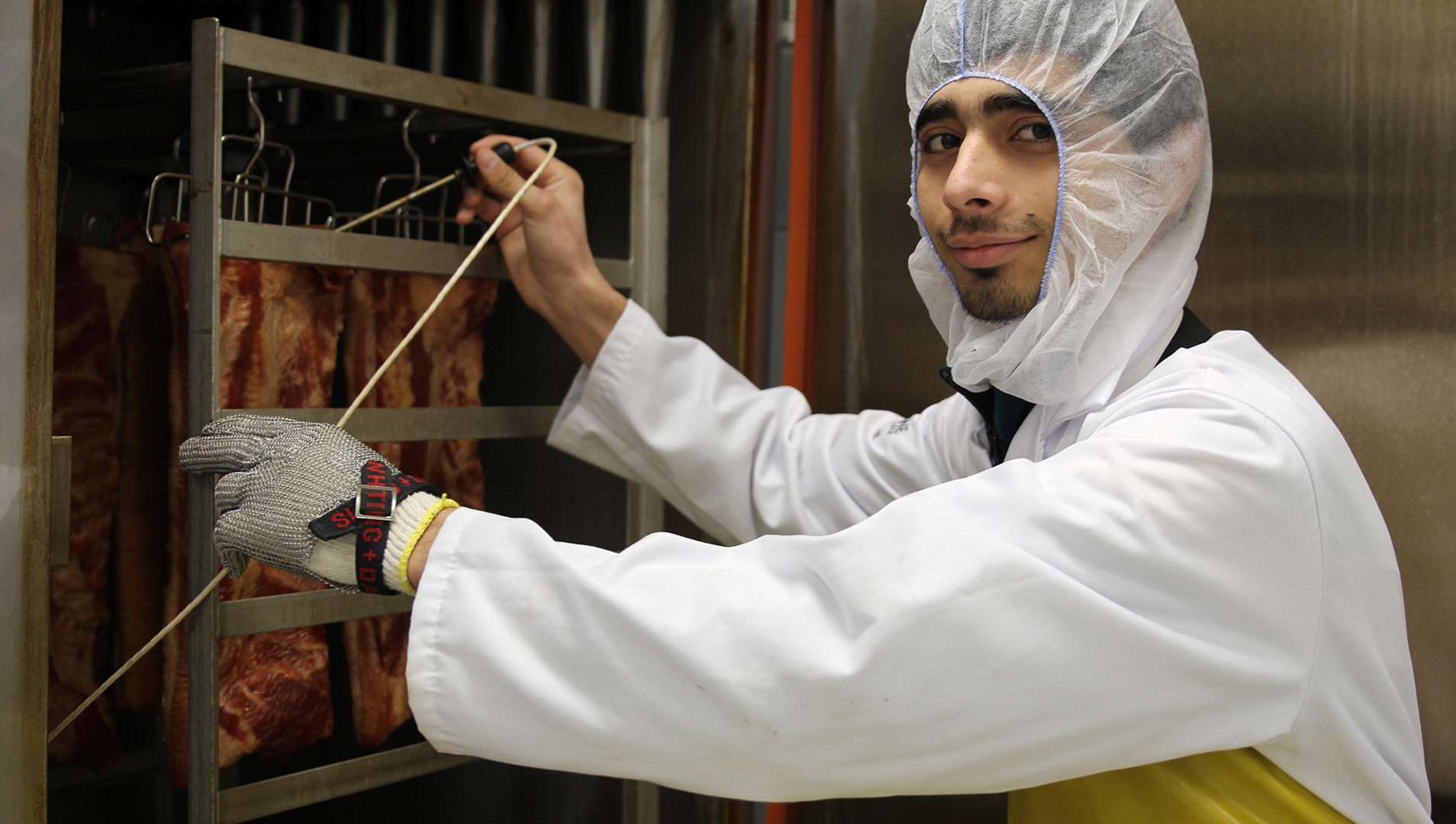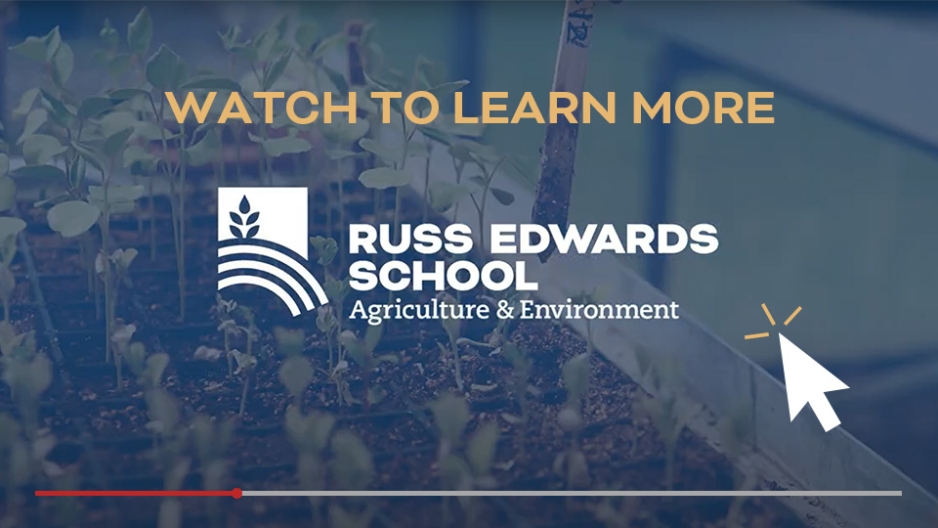Food Processing
Animal Proteins
Overview
Our eight-month Food Processing (Animal Proteins) certificate program (11-months for international students), focuses on providing the skills and experiences needed to immediately begin working in Canada’s growing meat processing industry.
Students learn all aspects of the retail meat cutting/butcher trade, as well as develop specialized industrial skills in high demand by local employers in the meat processing industry.
Earn while you learn! Students in this program are eligible for paid practicum placements towards the end of their program. This sector has high employment opportunities after graduation.
Program Learning Outcomes
- Understand the fundamentals of meat theory including meat structure, nutrition, grading and inspection.
- Order, judge and select meats.
- Use safe and sanitary practices relating to meat storage and handling.
- Prepare fresh meat (poultry, beef, pork, goat and lamb), fish, poultry and value-added items.
- Process pork carcasses into primal cuts.
- Butcher and package pork primal cuts into value-added specifications for local, national and international premium markets.
- Carry out other tasks related to the processing of meat for shipping to customers or storage.
- Care for and safely operate hand tools and power meat-cutting equipment.
- Provide quality customer service during the Retail Meat Store training component.
- Engage in business fundamentals, including purchasing, receiving, marketing strategies, inventory control and product merchandising.
- Apply business math techniques in profit principles, retail pricing and spreadsheet analysis.
- Adhere to Hazard Analysis and Critical Control Points (HACCP), Canadian Food Inspection Agency (CFIA) and food safety standards.
Examples of jobs that graduates from the program can do:
Graduates may find work as industrial butchers and meat cutters, poultry preparers and related workers that prepare meat and poultry for further processing or for packaging for wholesale distribution. They are employed in meat and poultry slaughtering, processing and packing establishments.
Graduates may also find work as retail meat cutters, meat processes, and butchers that prepare standard and specialty cuts of meat, poultry, fish and shellfish for sale in retail or wholesale food establishments. They are employed in industrial settings such as food processing plants, or retail settings such as supermarkets or butcher shops.
Examples of what meat-cutters/butchers can do:
- Cut beef, lamb, pork or veal carcasses or sides or quarters of carcasses into primal cuts for further cutting, processing or packaging.
- Cut meat and poultry into specific cuts for institutional, commercial or other wholesale use.
- Cut, trim, bone and otherwise prepare custom and/or standard cuts of meat, poultry, fish and shellfish for sale.
- Prepare meat for special displays and/or delivery.
- Shape, lace and tie roasts and other meats, poultry or fish and may wrap or package fresh, frozen or prepared meats.
- Manage inventory, keep records of sales and determine the amount, product line and freshness of products according to company and customer requirements.
Success Factors
You might be a good fit for this program if you would enjoy:
- Working in the meat industry in Canada, including a paid practicum placement in the industry for 12 weeks.
- Learning about practical cutting methods, preparation of specialty meats, storing and handling meats and general operation and maintenance of shop equipment, sausage-making and value-added meat products.
- A physically demanding occupation in an industrial environment.
The industry and program environment require individuals to:
- Have physical strength and stamina as well as mobility and motor skills to undertake the required tasks.
- Have good manual dexterity.
- Ability to perform repetitive physical tasks and stand for long periods of time.
- Use knives and other equipment to disassemble hog (pork) and beef product for further processing
- Ability to work in a wide range of environmental conditions from cool to warm and wet to dry, and to work in refrigerated environments for long periods.
- Stand for long periods of time, while using saws, meat grinders and slicers, knives, and many other types of kitchen equipment.
- Cooperate with others in a diverse team environment.
- Ensure safe and hygienic practices are applied to all tasks.
- Adhere to strict personal hygiene standards.
- Work shift work as this is reflective of typical work hours in industry, and the environment can often be loud.
Admissions
Admission Requirements
- A complete Manitoba Grade 12 or equivalent
- Must be 18 years of age by the practicum start date
- Food Processing Self Declaration form
If you received your education outside of Manitoba, please review the equivalent admission requirements: Interprovincial or International.
Students must pass required medical and kinesiology tests prior to practicum placement.
English is the language of instruction at Assiniboine. All applicants educated outside of Canada or in a country not on the test exempt list are expected to meet the English language proficiency requirements. IELTS Academic score of 5.5 with no sub-score less than 5.0 (or equivalent) is acceptable for this program.
READY TO TAKE THE NEXT STEP IN YOUR EDUCATION JOURNEY?
All applicants must sign and submit the Food Processing (Animal Proteins) Self Declaration form with their application. Applications that do not include this form will be considered incomplete.
Start your online application today and join Assiniboine College! View the Food Processing Program Application Checklist for further details and to help you compile your documents.
DON'T MEET ADMISSION REQUIREMENTS?
If you don’t meet admission requirements, visit our Centre for Adult Learning to upgrade courses.
Careers & Connections
Career Opportunities
- Abattoirs
- Specialty meat operations
- Large scale processing plants
- Supermarkets and retail
Connections
Graduates of this program are eligible to receive credit in Assiniboine’s Culinary Arts and Hospitality Business Management programs for the following certifications: Emergency First Aid, Fire Safety, Food Safe 1, and WHMIS 1.
Assiniboine has a number of agreements with other colleges, universities and professional organizations, making it possible to apply credit taken at Assiniboine to programs at other institutions. For information on agreements, see Articulation Agreements.
Upon completion of this program, graduates will have the following certifications:
- First Aid
- Workplace Hazardous Materials Information System (WHMIS)
- FoodSafe
- Fire Safety
Tools & Supplies
Our classrooms, labs and shops are equipped with the necessary equipment that you need to make the most of your experience. However, there are some tools and supplies that you will need to purchase for personal use to help you with your studies. Much of what you purchase you’ll be able to use after you graduate and begin your career.
Program Checklists, Textbooks, and Supplies
ASSINIBOINE BOOKSTORE
Textbooks, supplies and uniforms may be purchased at the Assiniboine Bookstore at the Victoria Avenue East Campus. Booklists, tool lists and supply lists are available from your school office 30 days prior to the start date of your program.
Technology Requirements
Programs at Assiniboine have certain technology requirements. Students require access to computer devices at home and may be required to bring these on campus when instructed. For more details, see At-Home Computing.
Courses & Costs
Costs
Estimated Program Costs (Domestic)
| Credits | 72.0 |
| Tuition | $6,107 |
| Course Fees | $1,463 |
| Students' Association fees (including Health Premium) | $240 |
| Estimated textbooks, tools, and supplies | $500 |
All fees are estimated and subject to change without notice.
Estimated Program Costs (International)
| Credits | 88.5 |
| Tuition and Fees | $18,495 |
| Course Fees | Included |
| Students' Association fees (including Health Premium) | Included |
| Required Health Insurance | $1,125 |
| Estimated textbooks, tools, and supplies | $250 |
All fees are estimated and are subject to change without notice. All international students must purchase health insurance. The college adds this fee to your student account and then sends your name and fee to the insurance provider on your behalf.
All tuition and fees are required to be paid in full before your program begins. Tuition and fees to this program are non-refundable and non-transferable. All fees are estimated and subject to change without notice.
Students may be required to purchase additional supplies for this program.
For more information, visit the Fees and Charges page.
Courses
Course offerings are subject to change and may vary by intake.
Courses (Domestic)
| Title | Credits/CEUs | Elective | Distance | PLAR |
|---|---|---|---|---|
1st Aid - Emergency (HLTH-0030)Basic First Aid and CPR techniques taught in an interactive environment for individuals and employees who want an overview of First Aid and CPR in the workplace or home. The course covers skills needed to recognize, prevent and respond to cardiovascular emergencies for adults, CPR and other topics such as choking, airway and breathing emergencies, and prevention of disease transmission. This course meets the minimum regulations for Workplace Health and Safety for Basic First Aid. Participants who meet the required standard receive a nationally recognized certification that is valid for three years. |
0 credit(s) | No | No | No |
Bovine Species - Front Quarter (MTPR-0012)This course includes beef and veal carcass-breaking procedures, producing primal, secondary, fabricated, retail, and value-added products, grading, inspection, product identification, costing, and wrapping. |
3 credit(s) | No | No | No |
Communication - Retail Meats (COMM-0384)This course provides students with the theoretical understanding of the field of communications within the |
6 credit(s) | No | No | No |
Curing and Smoking (MTPR-0003)This course includes production and processing of common cured and smoked varieties of sausages, bacons, hams, other smoked or cured products, packaging, wrapping, and costing. |
6 credit(s) | No | No | No |
Fire Safety (WRKP-0021)This awareness seminar is provided by the City of Brandon Fire Department. Participants learn to identify various fire types and understand their individual characteristics. Fire hazard identification and fire safety procedures are demonstrated in relation to food service operations. Participants learn the functions of a fire extinguisher, coupled with a practical learning exercise demonstrating proper handling and extinguishing techniques. |
0 credit(s) | No | No | No |
FoodSafe 1 (COOK-0014)This seminar, delivered by Manitoba Health, is a must for owners, managers, supervisors, chefs, cooks and other personnel responsible for purchasing, handling, preparing and serving food. FoodSafe is a nationally-recognized seminar that addresses the relationship between microbiology and food-borne illness, safe food handling, personal hygiene habits, effective cleaning and sanitizing of equipment and utensils, and measures to ensure a clean, safe foodservice operation. Participants who pass the examination receive a nationally-recognized certificate which is valid for five years. Textbook included in cost of tuition. |
0 credit(s) | No | No | No |
Meat Composition & Nutrition (MTPR-0014)This course includes nutritional value of meat products, muscle types and composition, cooking of raw meats, cooking methods for different muscle groups, and advising consumers on cooking various meat products. |
6 credit(s) | No | No | No |
Ovine Species and Seafood (MTPR-0005)This course includes identification and production of primal, sub-primal, retail and value added cuts from Canadian lamb and goat, with study of common species of seafood. It includes lamb carcass breaking, merchandising, grading and specification, and retail wrapping and pricing of lamb, goat and seafood products. |
3 credit(s) | No | No | No |
Pork (MTPR-0006)This course includes breaking down pork carcasses into primal and sub-primal cuts, grading, preparing, packaging, and costing retail pork products. The course content about breaking carcasses specifically goes through the distinction between International cuts. Practical work breaking carcasses could happen on practicum since the program does not include bringing carcasses on site. |
6 credit(s) | No | No | No |
Pork - International Cuts (MTPR-0015)In this course, students learn how to process primal cuts of pork using the various international carcass breaking styles. |
9 credit(s) | No | No | No |
Poultry (MTPR-0016)This course includes common poultry species, producing fabricated, retail, and value-added poultry products, grading, wrapping, and costing products. |
3 credit(s) | No | No | No |
Practicum - MTPR (PRAC-0274)The practicum component of the course develops employability and trade-specific skills in either the wholesale or the retail meat-cutting environment. |
12 credit(s) | No | No | No |
Safety, Tools, Sanitation (HLTH-0282)Prerequisites: HLTH-0030 1st Aid Emergency, COOK-0014 FoodSafe 1, HLTH-0047 WHMIS 1 |
3 credit(s) | No | No | No |
Sausage Making (MTPR-0009)This course includes history of sausage manufacturing, spices, equipment and safety, diseases associated with sausage manufacturing, formulating, mixing, stuffing, packaging, and pricing. |
3 credit(s) | No | No | No |
Student Success (IAPP-0001)This course integrates elements of student orientation including familiarization with college policies and improves the students' ability to navigate the college experience and environment. This course also offers the learner an opportunity to learn and practice the essential study skills needed to thrive in a Canadian post-secondary program of study. The course covers topics such as success in online learning, time management strategies, communication skills, test taking strategies, academic integrity, and information literacy, among others. Students must pass this introductory course to progress in the program. |
6 credit(s) | No | No | No |
Value Added Processing (MTPR-0010)This course includes content related to identifying methods and ingredients used in making value-added meat products. Production of value-added pork, beef, and poultry products is also included. |
3 credit(s) | No | No | No |
WHMIS 1 (HLTH-0047)If you work in the proximity of hazardous materials, this awareness course is for you. As an introduction to Workplace Hazardous Materials Information System (WHMIS), this course covers safe work habits with hazardous materials, Material Safety Data Sheets (MSDS), and labelling of hazardous materials. This course is presented in a straightforward, non-technical manner. |
0 credit(s) | No | No | No |
Courses (International)
| Title | Credits/CEUs | Elective | Distance | PLAR |
|---|---|---|---|---|
1st Aid - Emergency (HLTH-0030)Basic First Aid and CPR techniques taught in an interactive environment for individuals and employees who want an overview of First Aid and CPR in the workplace or home. The course covers skills needed to recognize, prevent and respond to cardiovascular emergencies for adults, CPR and other topics such as choking, airway and breathing emergencies, and prevention of disease transmission. This course meets the minimum regulations for Workplace Health and Safety for Basic First Aid. Participants who meet the required standard receive a nationally recognized certification that is valid for three years. |
0 credit(s) | No | No | No |
Bovine Species - Front Quarter (MTPR-0012)This course includes beef and veal carcass-breaking procedures, producing primal, secondary, fabricated, retail, and value-added products, grading, inspection, product identification, costing, and wrapping. |
3 credit(s) | No | No | No |
Cdn Intercultural Awareness (IAPP-0002)This course is designed to assist international students to transition into, and succeed in, the diverse Canadian workplace. Cultural values and expectations in a professional environment are examined through a variety of methods. Students explore the variety of cultures in Canada, including those of Indigenous peoples. The possible effects of culture on the various roles and the scope of practice in their field of study are explored. Strategies to successfully begin a new job, to create effective working relationships and to resolve conflict are discussed and practiced. Interpersonal and inter-professional communication is reviewed. The importance of concepts such as non-verbal communication, personal and professional etiquette and working as part of a team are emphasized. Students must pass this introductory course to progress in the program. |
6 credit(s) | No | No | No |
Communication - Retail Meats (COMM-0384)This course provides students with the theoretical understanding of the field of communications within the |
6 credit(s) | No | No | No |
Curing and Smoking (MTPR-0003)This course includes production and processing of common cured and smoked varieties of sausages, bacons, hams, other smoked or cured products, packaging, wrapping, and costing. |
6 credit(s) | No | No | No |
Fire Safety (WRKP-0021)This awareness seminar is provided by the City of Brandon Fire Department. Participants learn to identify various fire types and understand their individual characteristics. Fire hazard identification and fire safety procedures are demonstrated in relation to food service operations. Participants learn the functions of a fire extinguisher, coupled with a practical learning exercise demonstrating proper handling and extinguishing techniques. |
0 credit(s) | No | No | No |
FoodSafe 1 (COOK-0014)This seminar, delivered by Manitoba Health, is a must for owners, managers, supervisors, chefs, cooks and other personnel responsible for purchasing, handling, preparing and serving food. FoodSafe is a nationally-recognized seminar that addresses the relationship between microbiology and food-borne illness, safe food handling, personal hygiene habits, effective cleaning and sanitizing of equipment and utensils, and measures to ensure a clean, safe foodservice operation. Participants who pass the examination receive a nationally-recognized certificate which is valid for five years. Textbook included in cost of tuition. |
0 credit(s) | No | No | No |
Meat Composition & Nutrition (MTPR-0014)This course includes nutritional value of meat products, muscle types and composition, cooking of raw meats, cooking methods for different muscle groups, and advising consumers on cooking various meat products. |
6 credit(s) | No | No | No |
Ovine Species and Seafood (MTPR-0005)This course includes identification and production of primal, sub-primal, retail and value added cuts from Canadian lamb and goat, with study of common species of seafood. It includes lamb carcass breaking, merchandising, grading and specification, and retail wrapping and pricing of lamb, goat and seafood products. |
3 credit(s) | No | No | No |
Pork (MTPR-0006)This course includes breaking down pork carcasses into primal and sub-primal cuts, grading, preparing, packaging, and costing retail pork products. The course content about breaking carcasses specifically goes through the distinction between International cuts. Practical work breaking carcasses could happen on practicum since the program does not include bringing carcasses on site. |
6 credit(s) | No | No | No |
Pork - International Cuts (MTPR-0015)In this course, students learn how to process primal cuts of pork using the various international carcass breaking styles. |
9 credit(s) | No | No | No |
Poultry (MTPR-0016)This course includes common poultry species, producing fabricated, retail, and value-added poultry products, grading, wrapping, and costing products. |
3 credit(s) | No | No | No |
Practicum - MTPR (PRAC-0274)The practicum component of the course develops employability and trade-specific skills in either the wholesale or the retail meat-cutting environment. |
12 credit(s) | No | No | No |
Safety, Tools, Sanitation (HLTH-0282)Prerequisites: HLTH-0030 1st Aid Emergency, COOK-0014 FoodSafe 1, HLTH-0047 WHMIS 1 |
3 credit(s) | No | No | No |
Sausage Making (MTPR-0009)This course includes history of sausage manufacturing, spices, equipment and safety, diseases associated with sausage manufacturing, formulating, mixing, stuffing, packaging, and pricing. |
3 credit(s) | No | No | No |
Seminar (IAPP-0003)This course offers students an opportunity to apply the knowledge that they have acquired in previous courses. Learners demonstrate research skills and the ability to cite sources. They participate in case scenarios, using industry terminology, that utilize numeracy skills and problem based learning techniques to foster deep understanding of good client/customer service. Students must pass this introductory course to progress in the program. |
4.5 credit(s) | No | No | No |
Student Success (IAPP-0001)This course integrates elements of student orientation including familiarization with college policies and improves the students' ability to navigate the college experience and environment. This course also offers the learner an opportunity to learn and practice the essential study skills needed to thrive in a Canadian post-secondary program of study. The course covers topics such as success in online learning, time management strategies, communication skills, test taking strategies, academic integrity, and information literacy, among others. Students must pass this introductory course to progress in the program. |
6 credit(s) | No | No | No |
Value Added Processing (MTPR-0010)This course includes content related to identifying methods and ingredients used in making value-added meat products. Production of value-added pork, beef, and poultry products is also included. |
3 credit(s) | No | No | No |
WHMIS 1 (HLTH-0047)If you work in the proximity of hazardous materials, this awareness course is for you. As an introduction to Workplace Hazardous Materials Information System (WHMIS), this course covers safe work habits with hazardous materials, Material Safety Data Sheets (MSDS), and labelling of hazardous materials. This course is presented in a straightforward, non-technical manner. |
0 credit(s) | No | No | No |
Workplace Communication (IAPP-0004)This course is designed to provide international students with the communication skills required to transition successfully into the Canadian workplace. It prepares learners to utilize effective communication skills both personally and professionally. Students use a broad range of activities to develop proficiency in industry terminology, explore scenarios from the field, develop critical thinking skills, and develop effective strategies to enhance their skills in writing and oral communication. Students must pass this introductory course to progress in the program. |
6 credit(s) | No | No | No |





